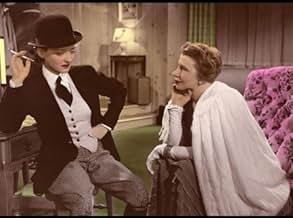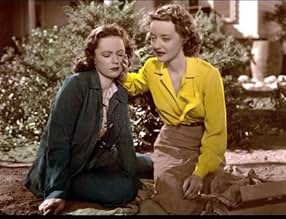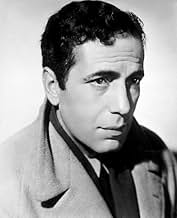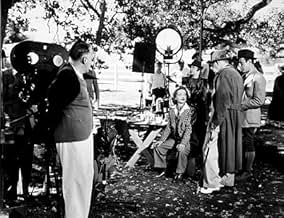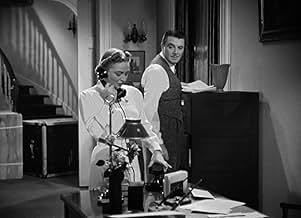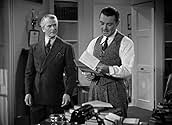IMDb-BEWERTUNG
7,4/10
13.130
IHRE BEWERTUNG
Füge eine Handlung in deiner Sprache hinzuA young socialite is diagnosed with an inoperable brain tumor, and must decide whether or not she'll meet her final days with dignity.A young socialite is diagnosed with an inoperable brain tumor, and must decide whether or not she'll meet her final days with dignity.A young socialite is diagnosed with an inoperable brain tumor, and must decide whether or not she'll meet her final days with dignity.
- Regie
- Drehbuch
- Hauptbesetzung
- Für 3 Oscars nominiert
- 5 Gewinne & 4 Nominierungen insgesamt
Black Ace
- Judith's Horse
- (Nicht genannt)
Marian Alden
- Judith's Friend
- (Nicht genannt)
Wilda Bennett
- Judith's Friend
- (Nicht genannt)
Diane Bernard
- Lucy - a Servant
- (Nicht genannt)
Empfohlene Bewertungen
Bette Davis always cited this as her favourite role: it is probably on a par with Margo Channing in ALL ABOUT EVE as the part which fans identify with as definitive Davis. Naturally, this 1939 film will look a little musty, corny and cliched to modern day viewers, but the poignant sincerity in which Davis instilled via her magnificent performance still has the ability to leave the viewer in helpless tears: you can be dumbfounded to think that something so obviously aimed at your tear ducts could succeed to induce the flow so completely and spontaneously! The role is based upon a 1934 play in which Tallulah Bankhead flopped. The character of Ann King was written especially for the film by director Edmund Goulding: as a kind of Greek Chorus so Judith wouldn't have to complain about the inevitable. Geraldine Fitzgerald, in her American film debut, does a wondrous job with the part of Ann: a beautifully etched supporting performance. As Michael O'Leary, Humphrey Bogart is unfortunately inept in the Irish brogue department (why couldn't they have simply cut out the accent?) and George Brent is adequately wooden as Dr. Frederick Steele whom Judy marries. Davis slams through a gooey collection of cliches in her nerviest style during the early segments but her metamorphasis into a vibrantly humbled married woman is quite a striking contrast to the selfishly brazen spoiled heiress: truly a multi-faceted performance. Ronald Reagan gets to play Alec, one of Judy's drunken swains, and Cora Witherspoon is memorable as the snotty Carrie. The last twenty minutes of the film are expertly crafted and timelessly tear-jerking: the movie sold more kleenex than any other of its day.
It's easy to see why Bette Davis admired "Dark Victory" more so than any of her other star-vehicles--her Judith Traherne is the quintessential Bette Davis character: smart, sassy, nervously gay, a drinking pal to the guys and a best buddy to the girls. Traherne is without malice, a real chum, and Davis plays her with fluttery vitriol and upper-crust glee. Long Island society girl, ailing but still strong, falls wildly in love with her doctor...but how can he tell her that she has very little time left to live? The supporting cast is made up of some odd personalities: Geraldine Fitzgerald's dedicated girlfriend seems to have no life outside of Judith's world (and performs her gal-pal duties with a curious severity); Humphrey Bogart is an Irish stable-hand with a secret crush on Judith (she's tempted, but ultimately conveys to him the old 'don't touch' message); Ronald Reagan is a country club type, always in a tuxedo and at the bar; George Brent is the brilliant surgeon who loves Judith (but he's faster with his fists than he is with words). Based on a play by George Emerson Brewer, Jr. and Bertram Bloch (which had starred Tallulah Bankhead), this chatty Warner Bros. weeper is glossy and flossy, a dithering, overstated, swooning romantic mini-epic for masochists. In other words, the archetypal Bette Davis film. *** from ****
When Bette Davis was in ball buster mode, watch out!! But when she decided to suffer nobly, she could suffer with the best of them.
In "Dark Victory," Davis plays a woman dying from the deadliest of deadly diseases---the vague, unnamed illness that beautiful actresses died of in movies from the 1930s. The symptoms never seem to be the same, but they're always tear-inducing. Here, they make Davis go blind and we know when the disease is getting worse because a fuzzy black halo begins to appear around the edges of the frame.
Actually, this movie is a rather pale companion to the ultimate Davis melodrama, "Now, Voyager." But it has perhaps my favorite line ever delivered in a Bette Davis movie. She's found out that her illness is fatal, and she's at dinner with the doctor who has kept this from her to protect her fragile soul. When the waiter comes to take her order, she says, "How about a nice big helping of..." pause, as she throws the most withering of withering stares at her companion ..."prognosis negative." That should really be on a bumper sticker somewhere.
As for the other actors.....wait, other actors? No one watches a Bette Davis movie to see other actors. I'm not even sure there were any other actors in this movie.
Grade: B
In "Dark Victory," Davis plays a woman dying from the deadliest of deadly diseases---the vague, unnamed illness that beautiful actresses died of in movies from the 1930s. The symptoms never seem to be the same, but they're always tear-inducing. Here, they make Davis go blind and we know when the disease is getting worse because a fuzzy black halo begins to appear around the edges of the frame.
Actually, this movie is a rather pale companion to the ultimate Davis melodrama, "Now, Voyager." But it has perhaps my favorite line ever delivered in a Bette Davis movie. She's found out that her illness is fatal, and she's at dinner with the doctor who has kept this from her to protect her fragile soul. When the waiter comes to take her order, she says, "How about a nice big helping of..." pause, as she throws the most withering of withering stares at her companion ..."prognosis negative." That should really be on a bumper sticker somewhere.
As for the other actors.....wait, other actors? No one watches a Bette Davis movie to see other actors. I'm not even sure there were any other actors in this movie.
Grade: B
I was probably 12 years old when I first saw this film on TV. It was shown in two parts and I didn't get to see the second part, so my mother had to tell me what happened.
Forty years later, I still cry every time I see "Dark Victory." It remains one of my favorite films for sheer use of Kleenex and my favorite Bette Davis movie, "All About Eve" being right up there with it. I even saw it on the big screen in a revival house when I was in college.
Yes, some of the dialogue sounds corny now, like the good doctor saying, "Women never meant anything to me before". But the interesting thing is, when I did see it with an audience, though they laughed as some inappropriate spots, by the end you could hear the sobs on the next block.
There have been comments that Humphrey Bogart seems miscast in a somewhat minor role. I frankly thought he was just fine. He certainly was short enough to be a jockey and he pulled off the brogue.
I'm sure it's confusing for some to see him in such a small role in 1939 when only a few years later, he was a total superstar. But he was under contract to Warners and kicked around for years before "High Sierra" and "Casablanca".
He obviously wasn't working when "Dark Victory" was cast, so why let him sit around taking a salary and do nothing?
And of course we have Ronald Reagan as a playboy. I actually find him delightful in this film. It called for charm and he had it.
In today's fast-paced world, there's nothing stronger than a message about time and our use of it. "Oh, give me time for tenderness...just give me time."
Like Bette's character, I want to hear that song again too, in many more viewings of "Dark Victory."
Forty years later, I still cry every time I see "Dark Victory." It remains one of my favorite films for sheer use of Kleenex and my favorite Bette Davis movie, "All About Eve" being right up there with it. I even saw it on the big screen in a revival house when I was in college.
Yes, some of the dialogue sounds corny now, like the good doctor saying, "Women never meant anything to me before". But the interesting thing is, when I did see it with an audience, though they laughed as some inappropriate spots, by the end you could hear the sobs on the next block.
There have been comments that Humphrey Bogart seems miscast in a somewhat minor role. I frankly thought he was just fine. He certainly was short enough to be a jockey and he pulled off the brogue.
I'm sure it's confusing for some to see him in such a small role in 1939 when only a few years later, he was a total superstar. But he was under contract to Warners and kicked around for years before "High Sierra" and "Casablanca".
He obviously wasn't working when "Dark Victory" was cast, so why let him sit around taking a salary and do nothing?
And of course we have Ronald Reagan as a playboy. I actually find him delightful in this film. It called for charm and he had it.
In today's fast-paced world, there's nothing stronger than a message about time and our use of it. "Oh, give me time for tenderness...just give me time."
Like Bette's character, I want to hear that song again too, in many more viewings of "Dark Victory."
Judith is a wealthy Long Island society girl given to a dizzy lifestyle
Self-assured of her affluence and her faculty over men, she is unprepared for tragedy, which strikes in the form of a brain tumor
The underlying bravery and courage with which she faces this physical suffering eventually demonstrates the woman of substance that she is
Among her friends is Ann King (Fitzgerald), her secretary, and handsome young Alex Hamm (Reagan), who directs her toward brain specialist Dr. Frederick Steele (Brent). The doctor diagnoses her illness as one which will end her life within a year Judith falls in love with him and accepts his proposal of marriage When she discovers that her tumor is calamitous, she rejects the doctor's proposal considering it an act with compassion
Davis provides scene after scene with the special magic only she was able of bringing vividly
Swept into the current of events was Bogart playing an Irish horse trainer, who fails in an attempt to make love to her, yet encourages her to enjoy her time with her true love, George Brent
The film was remade in 1963 as "Stolen Hours" with Susan Hayward, and as a 1976 TV movie under its original title with Elizabeth Montgomery
Among her friends is Ann King (Fitzgerald), her secretary, and handsome young Alex Hamm (Reagan), who directs her toward brain specialist Dr. Frederick Steele (Brent). The doctor diagnoses her illness as one which will end her life within a year Judith falls in love with him and accepts his proposal of marriage When she discovers that her tumor is calamitous, she rejects the doctor's proposal considering it an act with compassion
Davis provides scene after scene with the special magic only she was able of bringing vividly
Swept into the current of events was Bogart playing an Irish horse trainer, who fails in an attempt to make love to her, yet encourages her to enjoy her time with her true love, George Brent
The film was remade in 1963 as "Stolen Hours" with Susan Hayward, and as a 1976 TV movie under its original title with Elizabeth Montgomery
Wusstest du schon
- WissenswertesOff-screen, Bette Davis suffered a nervous breakdown during filming as a result of her crumbling marriage to Harmon Nelson. Reportedly, producer Hal B. Wallis convinced Davis that she could benefit by using these real-life emotions of pain and loss to enhance the portrayal of her character. Meanwhile, Davis's marital problems didn't prevent her from embarking on an affair with co-star George Brent. Davis and Brent appeared in a total of 11 movies together.
- PatzerWhen the setting changes to Vermont towards the end of the film, there is snow on the ground and it is obviously winter. Yet most of the trees in front of the house still have leaves on them.
- Alternative VersionenAlso available in computer-coloured version.
- VerbindungenFeatured in Stars on Horseback (1943)
- SoundtracksOH, GIVE ME TIME FOR TENDERNESS
(1939) (uncredited)
Music by Edmund Goulding
Lyrics by Elsie Janis
Sung by Vera Van
Top-Auswahl
Melde dich zum Bewerten an und greife auf die Watchlist für personalisierte Empfehlungen zu.
Details
Box Office
- Weltweiter Bruttoertrag
- 345 $
- Laufzeit
- 1 Std. 36 Min.(96 min)
- Farbe
- Sound-Mix
- Seitenverhältnis
- 1.37 : 1
Zu dieser Seite beitragen
Bearbeitung vorschlagen oder fehlenden Inhalt hinzufügen


